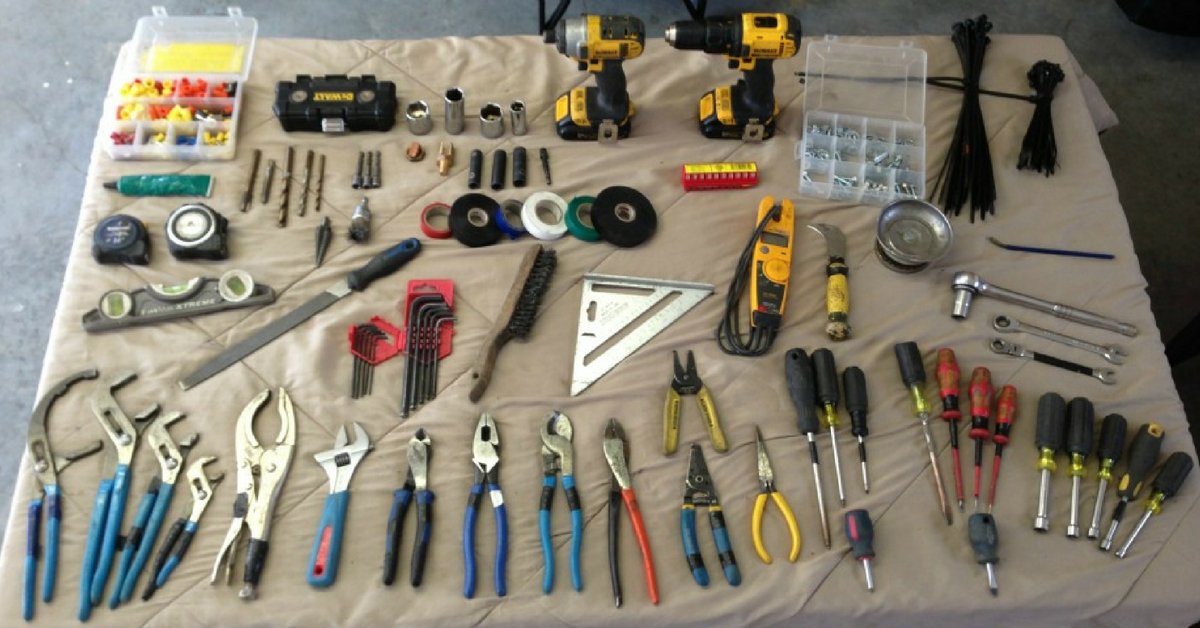


Assembling and maintaining an electrical tool kit with the proper tools and gear is one of your main responsibilities as an electrician. With increasingly diverse electrical components, making sure you have the right tools in your kit is essential.
Many new electricians may feel that they need to buy top of the line tools, but if your tools are sturdy and in good working condition you don’t have to spend a fortune. Most employers will provide a list of hand tools, while some may even provide you with a basic starter kit. In either case, the following list will give any new electrician a good starting point.
With the new electrical components, maintenance and repairs these days, making sure you have the right tools in your kit is the essential.
The electrician designs, installs and maintains electrical systems. Many first time rookie electricians feel that they need to buy top of the line tools, but as long as your tools are sturdy and in good working condition you don’t have to spend a fortune. It is recommended to start with a basic electrical tool kit set up.
An apprentice still has a long way to go before becoming a certified electrician, but still needs the right tools without having to buy the extras they will eventually need down the road. Whether you work as a residential, commercial or industrial electrician, your apprenticeship will usually be for four years, combined with classroom and on-the-job training.
Someone once said “It’s always recommended that you treat your new electrical tool kit like a woman would treat her purse. Always know where it is and treasure its contents even when lending something.” Apprentices, as well as some professionals can leave tools behind, and if they move from location to location, never get their tools back.
You may want to put your name on your personal tools if you intent to lead tools on the job site.
Your tool belt and pouch will keep the electrician tools organized, easy to find, and enable you to reach the tool that you need. You should have another pouch on your belt that is for holding screws and other small parts. Try to have one with at least three pockets.
Electrical systems are becoming more and more complex and employers are constantly searching for professionals trained in working with these complexities.
There are so many different tasks involved with repairing and maintaining electrical infrastructure. Depending on the job at hand will often dictate what tools you'll need to complete the job safely and effectively. This raises the requirements for an electrical tool kit. Some example tasks you must be able to do:

Industries that rely on a domestic demand such as metal product manufacturing, high technology, transportation, electrical equipment and food as well as component and appliance manufacturing have many job opportunities.
By specializing in as many different areas as you can, you will have more options to move through the different fields and land the career you want.
As the needs of businesses that hire electricians change, so does the job growth in each market. When becoming an apprentice electrician, do some research that will head you in the right direction as you begin your training toward becoming a certified electrician.
Now, grab your electrical tool kit and be the best electrician you can be.
As mentioned above you don’t necessarily need to buy the highest quality or most expensive hand tools. For a tool kit I would suggest investing in the higher quality brands. It is easy to lose small hand tools but its pretty difficult to lose an entire tool pouch.
Here are my top three favourite best tool bags for electricians to use in the field and, why I consider them as the best.
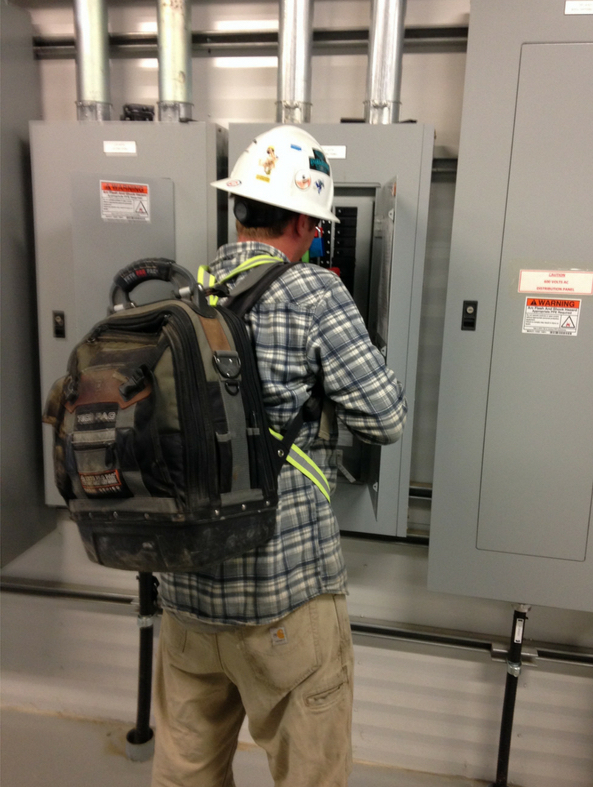
1. Veto Pro Pac – This one is probably the ultimate tool bag for electricians. I’ve seen this pouch fall from 40 feet and it sustained no damage!
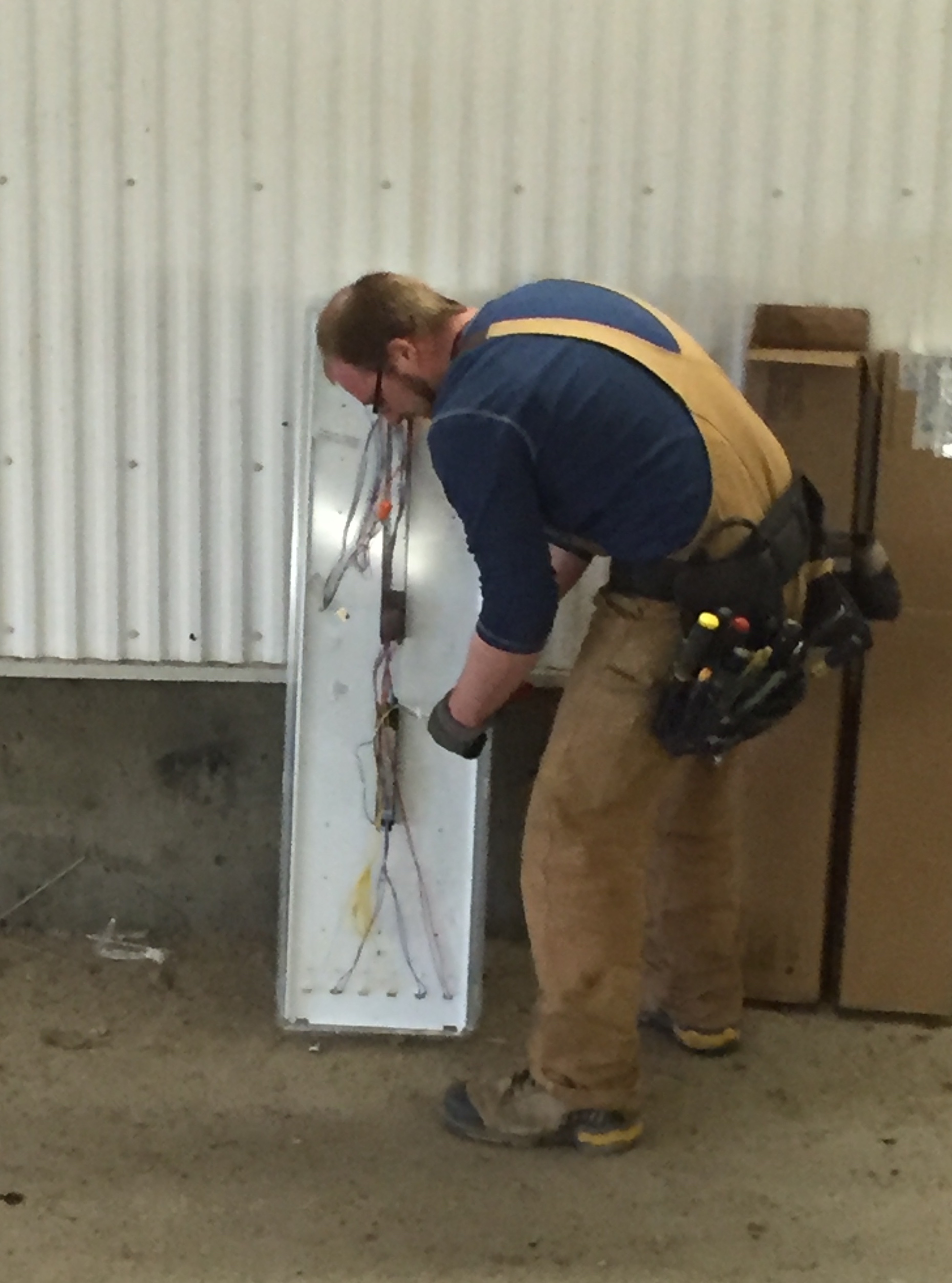
2. Klein Tool Belt , this belt is very comfortable to wear. Even when it is loaded with tools it does not become cumbersome around your waist.
3. Occidental Leather Pouch , this pouch is made with the highest quality leather.
The tool kits listed above are by no means the only high quality brands. I’ve listed them because I personally have used them or know people in the field who have. If there are other brands of tool kits you have used and prefer, and would like to share why they worked best, please feel free to contact me.
The most basic tools that you will need in your electrical tool kit are:
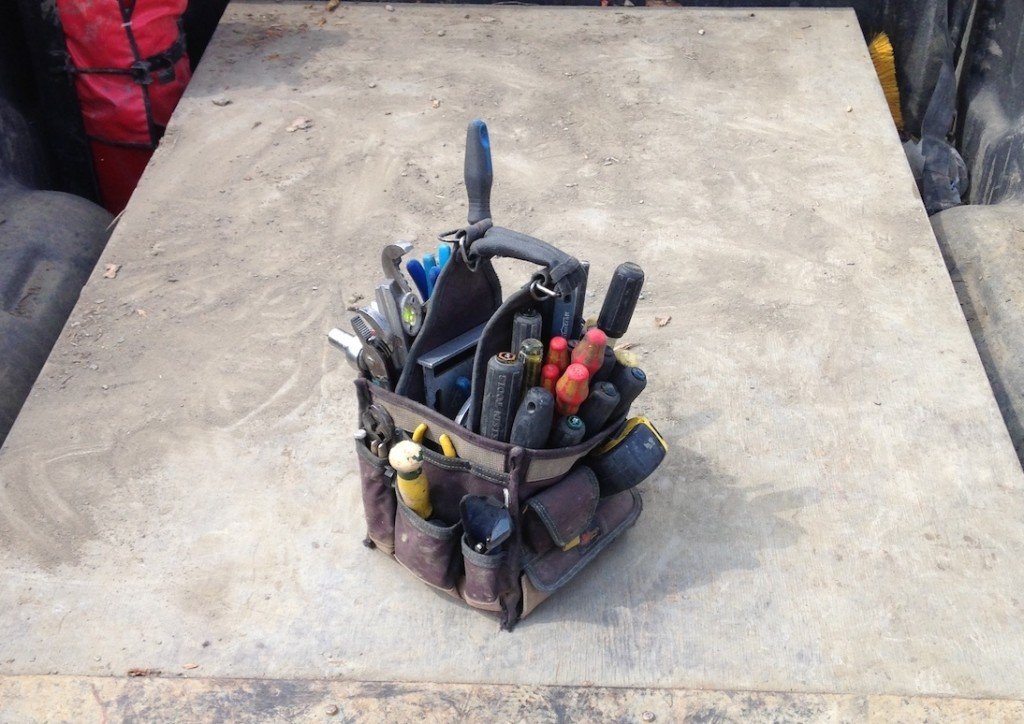
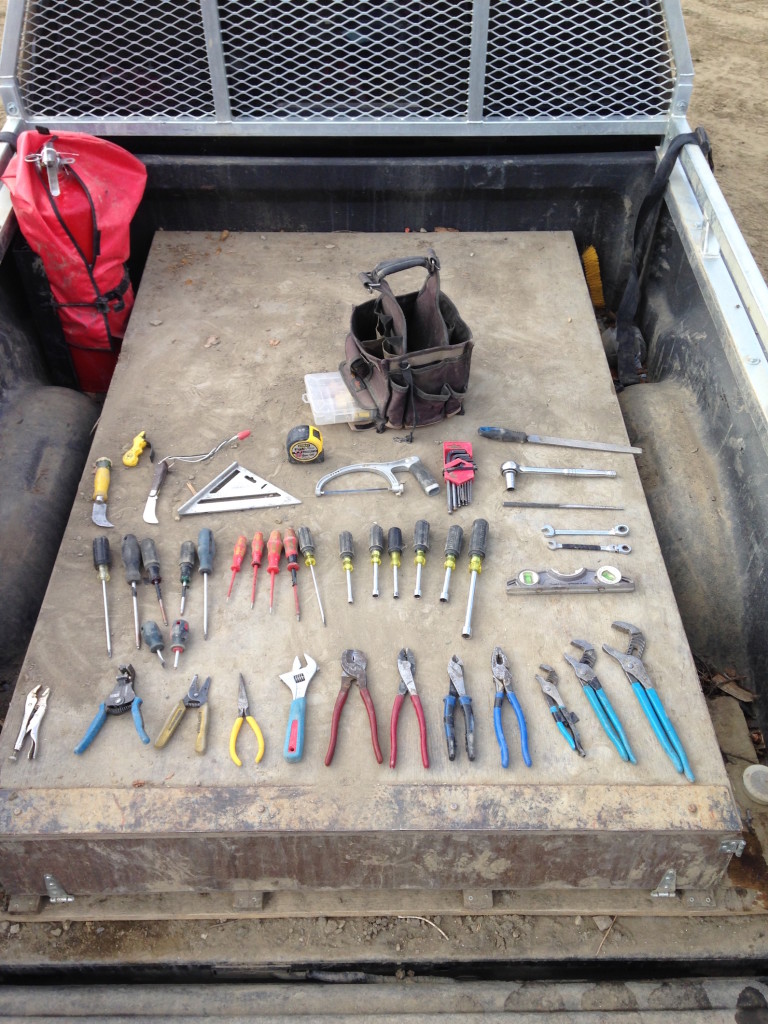
Heavy duty pliers for general use in cutting and twisting wires. They are ideal for twisting solid wires when splicing with wire nuts or for twisting off Ty-Rap ends. Sometimes called the “Electrician’s Hammer”, they can also cut small gauge steel wire.
If treated properly, this tool can last your entire electrical career. Even for a new electrician, it is worth the extra cost to get the best available brand. Klein Tools D213-9NETP is the industry standard, while the Journeyman 2000 Series is considered by many to be top of the line. Also worth a mention is the Knipex 09 12 240 SBA which features built in crimpers.
Side Cutters
Used to cut smaller gauge wires, they are also great for cutting in hard to reach areas. Next to the Linesman’s pliers, this will be one of your most used tools, so spending a little extra on a high-quality tool will go a long way. The Klein 8” Side Cutters are a great choice, as well as the Knipex version .
Cable Cutters
More powerful than regular pliers used to cut large conductors and smaller cable. Be sure to use these only on copper and aluminum. Also known as “eagle beaks”. Greenlee makes a fantastic cable cutter, with the Klein model being a popular choice as well.
Crimping Pliers
Used to install butt splices and Sta-kons. There is no need to splurge for the high-end brands for this tool, as long as you get a pair that can crimp insulated and non-insulated Sta-kons. A great option if you are running a truck or have a large tool bag is to pick up a Sta-kon kit which includes the Sta-kon branded crimping pliers as well as an assortment of useful Sta-kons. Or, pick up the Channellock crimpers .
Needle Nose Pliers
Used for gripping in tight spaces, I find these work best when the pliers are rough at the end. Again, the cheapest tool you can find will work just as well as the expensive brands and having a few different styles can come in handy.
Wire Strippers
Used to strip the insulation from wires, even apprentice electricians will be using these daily. Even the inexpensive Klein-Kurve pair will be adequate, but if you are doing many terminations in a day or wiring panels, I recommend the Katapult. A little more expensive and more prone to damage or breaking, their sheer speed and ease of use make up for it. The new model even incorporates a wire cutter, but I would stick with the side cutters.
Channellocks
While Channellock is technically only a brand of tools, everyone in the trade knows what to grab when you ask for Channellocks. Used to tighten conduit, conduit fittings, gang boxes and connectors. Having a few different sizes on hand is a must. The most common brands are, unsurprisingly, the Channellock Tongue-and-Groove Pliers , and the Irwin GrooveLock Pliers . Having a few different sizes on hand is highly recommended.
Used to tighten electrical termination lugs, look for a set that has a variety of sizes. A cheap set will work fine, so consider getting both standard and metric sizes.
Screwdrivers
You will tighten thousands of screws during your career, so having a high-quality tool that lasts longer and strips screws less frequently is important. A multi-head driver (like the Klein 11-in-1 or the Milwaukee 11-in-1) is perfect for new workers on a budget, but the quality of the tips is not as good as the separate drivers. As you work, you will find which ends you need the most – typically #2 Robertson, flat, and Phillips. I would recommend picking up individual drivers in those sizes as you can afford them.
If you will be doing work with small terminal blocks or in panels, look at picking up a properly sized set of terminators. Using the right size terminator for the terminal will ensure that your terminations are tight without stripping screws.
Speed wrenches are well worth the extra cost. The most commonly used sizes in Canada are 7/16, 1/2, and 9/16, so make sure the set you are looking at has those sizes. There will be different sizes used in the USA. If budget is a concern, look for a cheap set of normal wrenches instead.
Crescent Wrench
Handy when nut size isn’t known or for those rare metric sizes, look for a mid-range set with good jaws. There are ratcheting crescent wrenches, but they are more trouble than they are worth.
With a metal blade, these are designed for cutting conduit, cable armour, tray, and (if your foreman is a jerk) strut. Stick to a cheap hacksaw frame and keep a pack of replacement blades on hand. If you work with a lot of teck cable, consider the DeWalt 5-in-1 Hacksaw. It can be set up for flush cuts or can be taken apart and used in a compact mode, perfect for saving space in your tool bag.
Cable Stripping Tools
Used to strip cable and insulation, and as a general-purpose tool for opening boxes and packaging.
An important note, many employers and clients may have restrictions on what kind of knives they will permit on the worksite. Make sure to check with your supervisor to see if they have any restrictions on knives. Typically, companies will ban razor knives or boxcutter knives, and allow electrician-specific knives like the Klein Splicing Knife or the Knipex Hookblade Knife. When used correctly, these knives are much safer than cheap box-cutters or flip-knives.
Tape Measure
Used for measuring strut, conduit, tray, lumber, and many other things. A 25-foot tape measure should be sufficient for any task. Look for a model with a magnet built-in to the end, which helps when measuring by yourself.
Torpedo Level
Their small size makes them perfect for any tool-bag. Look for a heavy-duty brand that is magnetized for convenience and accurate readings.
Most used for residential or commercial work, a hammer doesn’t need to be fancy. The most common use for a hammer is for attaching wire staples and nails. If you are an industrial electrician, a hammer is not typically a priority.
Used for marking materials for cuts or to mark drill holes, there is nothing wrong with the good-old Sharpie. If you need something a little tougher, pick up a pack of the Milwaukee Inkzalls. They work in dust, on damp materials, and hold their shape longer than Sharpies.
Nut Drivers
Used where a wrench can’t, the most common sizes are 1/4, 5/16, 7/16, 1/2, and 9/16. Don’t waste your money on the expensive Klein set. Instead, look for brands that feature a hollow shaft which will allow you to spin nuts onto longer pieces of ready-rod or longer bolts.
You can never have enough tools. These are a few that, while not used every day, can come in handy for specific tasks or are generally useful to have. Watch for these when the are on sale, or when they are forgotten on the worksite by the previous crew.
Most commonly used sizes are 3/8, 7/16, 1/2, and 9/16. Look for an all-metal ratchet.
Aviation Pliers / Clamps
Comes in handy as an extra support, especially when working alone.
Can test volts AC/DC, Amps, resistance, continuity, temperature, and nearly anything else depending on the model.
If you are using a multimeter, especially to check that something you are about to work on has no voltage, you really are taking your own life in your hands. You absolutely need a tool you can trust, so stay away from the cheap Home Depot meters. The gold standard for meters is Fluke, but that quality comes with a price. A decent alternative is the Klein 600A Multimeter, which comes loaded with features and is a true RMS meter. The comparable Fluke 323 Meter is a bit more expensive, but when your own health and safety is hinging on your meter, you really want the best.
Used for cutting thick gauge wire.
Perfect for making accurate cut lines for a straight edge, they are most useful when paired with a circular saw.
When you need to run conductors through conduit you can't just simply push the wire through. You will need the assistance from a tool designed to aid in the process of pulling wire.
Used to cut straight edge in sheet metal or for opening stubborn plastic packaging.
Getting through walls of buildings is a normal occurrence as an electrician. Sometimes you'll need to run EMT through a while or push a teck cable through. In this case you will need to drill certain sized wholes to make a clean fit going through the wall.
Invaluable for inspection or looking for lost screws, even a small flashlight will go a long way. This magnetic telescopic pick-up tool has a built-in LED flashlight and is perfect for spotting and grabbing dropped parts or checking around corners and in tight spaces.
Comes in handy as an extra support, especially when working alone. Be creative with these, they can help you in so many different situations that you may never thought of. For example if you need to install a conduit nipple through a wall and need someone to hold the other side, you could simply clamp on a set of vise grips instead. This would hold the nipple in place, not allowing it to spin while you install the lock ring and plastic bushing.
The perfect place to store your tools, a good commercial electrical tool kit will keep your tools clean, dry, and easily accessible. Depending on your task and how many tools you use daily, you might have a few different bags for different circumstances. Here are a few styles, each with their own benefits and drawbacks.
Sometimes wearing an entire vest can go a long ways. If you need to climb ladders and scaffolding multiple times throughout the day then a tool vest would be a great option. This will allow you to carry all the tools you need without having to carry them by hand while climbing.
These bags are essentially an open bucket with pockets, pouches, and a handle. The biggest advantage of this style of bag is that all your tools are always easily accessible. If you only have a few tools and generally work indoors, this is an option to consider. The Klein 10” Tote Bag is a convenient and compact choice, while the DeWalt 11” Tool Carrier comes with a built in parts tray.
The downside to this style of bag is that it is not weather-proof and because there is no way to really close the bag, it is easy for anyone to walk by and “borrow” a tool.
Tool Pouches
A perfect mix of portability and storage, electrical tool pouches are perfect for moving a bunch of tools comfortably and safely. Heavy duty zippers will keep tools protected from dirt and debris and prevent them from falling out if it was tipped over. The Veto Pro Pac is probably the ultimate electrical tool kit for electricians. There are plenty of storage slots, so your tools are organized and easily visible. This is especially good when you are under pressure on the job and need specific tools to get an important piece of machinery up and running. I’ve seen this pouch fall from 40 feet and sustain no damage, and comes with an excellent warranty.
Your tool belt and pouch will keep the tools organized, easy to find, and enable you to reach the tool that you need. You should have another pouch on your belt that is for holding screws and other small parts. Try to find one with at least three pockets. This is a great setup when you are required to climb up and down ladders and scaffolding, and when you only need a few tools at a time. The Klein Tool Belt is very comfortable to wear. Even when it is loaded with tools it does not become cumbersome around your waist and provides quick and easy access to tools. For more even weight distribution, there are built-in attachment points for suspenders.
Another option is an Occidental Leather Pouch. This pouch is made with the highest quality leather, is long-lasting, and resistant to abuse.
As a contractor you will need to supply a lot of your own tools. Typically companies will pay an hourly wage for a tooled up truck that you own. In this case you will need an efficient and effective way to store all of your electrician tools.
The electrical tool kits listed above are by no means the only high-quality brands. I’ve listed them because I personally have used them or know people in the field who have. If there are other brands of tool kits you have used and prefer, and would like to share why they worked best, please feel free to contact me.